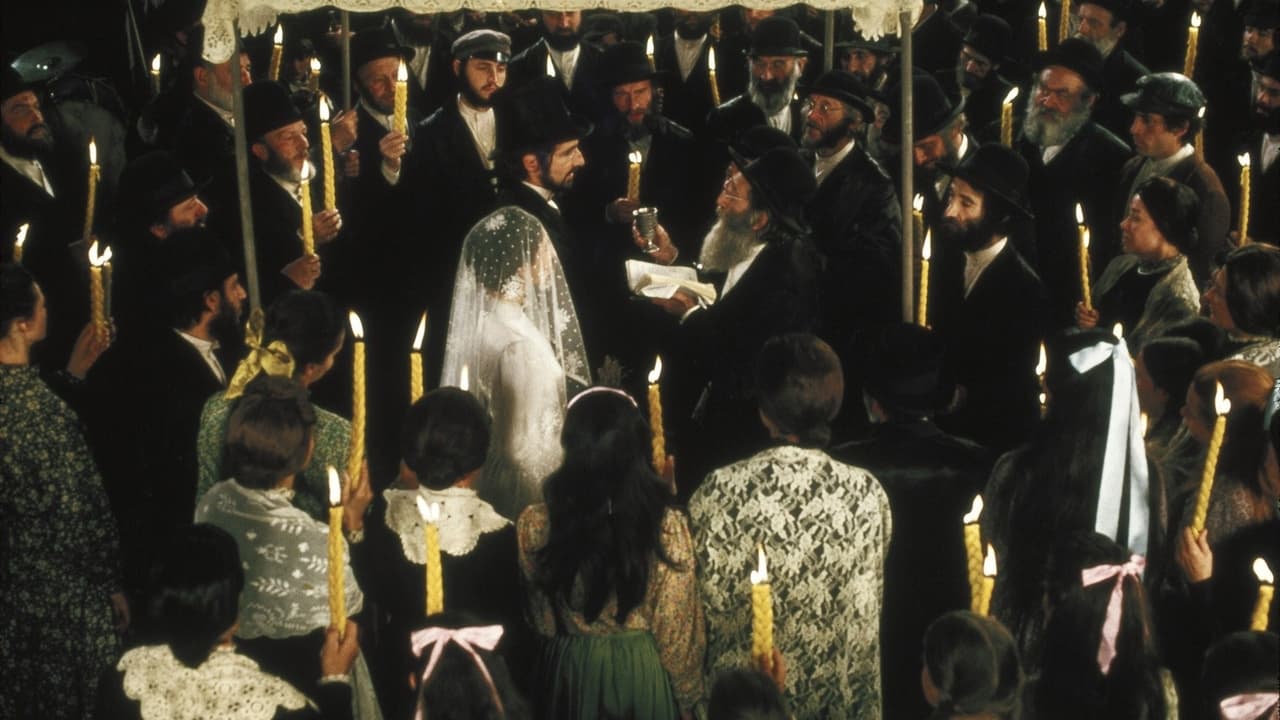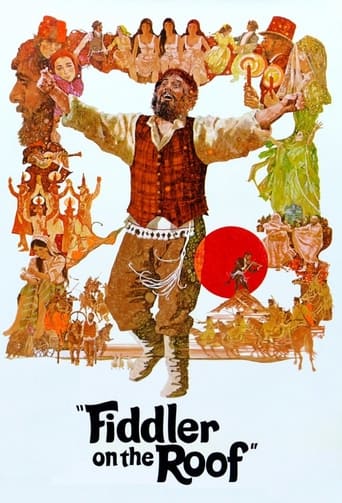

Perfectly adorable
... View MoreIn truth, there is barely enough story here to make a film.
... View MoreIt really made me laugh, but for some moments I was tearing up because I could relate so much.
... View MoreIt's a movie as timely as it is provocative and amazingly, for much of its running time, it is weirdly funny.
... View MoreWhat can I say? I'm Jewish and I liked it. Singing, dancing, talking, arguing, and of course tradition all visit with us and lift us up and capture us in the moment. We become part of the film with ease thus we hang on every word of Tevye played by Topol who the movie centers around. One of the songs "if I were a rich man" should touch everyone who is or is not rich because we all think the same. The Russian dance scene will pump up your blood and then will have you out of your chair and the prayer before the Sabbath is something to be remembered. Who wouldn't want to bless their family before eating? Ah yes the fiddler. Trying to make a go of it all wherever he is and in whatever he is doing never giving up but instead keeping that song in his heart. Got 3.5 hours on your hands? You do? then.....
... View MoreIts virtue - it works at each age. for children - to discover the universe of a shtetl. for young man - for understand the premises of Shoah. for adult - to compare the artistic virtues and the admirable humor. for an old viewer - for say, again and again, "this is the truth/reality/life" but, in same measure ,for remind than "on the other hand", life is magnificent. for a long time, at early age, Topol was my hero. not only for performance - great and impressive. but for the science to birth a form of magic who gives the profound sense of life. so, fascinating. like the best cure for every day sickness.
... View MoreTo celebrate my 1600th review for this site I turn to another of my favourite films. Like a number of other cinematic genres, such as the war film and the Western, the traditional Hollywood musical was to go into something of a decline in the late seventies, but the early part of the decade had seen two very fine examples, "Fiddler on the Roof" and "Cabaret". "Fiddler" is set in the Russian village of Anatevka in 1905. Actually, Anatevka is really two villages, one Jewish and one Christian, and there is little interaction between the two. Nearly all the main characters are drawn from the Jewish community.It amazes me that anti-Semites have sometimes attempted to brand Jews "rootless cosmopolitans", as Jewish communities have always struck me as very conscious of their roots, their traditions and identity. The film, like the Broadway musical on which it is based, can be seen as an exploration of the role of tradition in Jewish life. In the opening song, actually entitled "Tradition", the main character Tevye explains the importance of tradition to him and his neighbours. Several Jewish traditions, including a wedding and a Sabbath meal, are reproduced in the film.The film, however, also shows how the traditions which Tevye holds so dear are being challenged from within and threatened from without. Within Anatevka and the wider Jewish community the younger generation are starting to question the values which their parents have lived by. The threat from outside comes from state-sponsored anti-Semitism in the form of the pogroms. The film's title comes from a line of Tevye's; he compares the predicament of Russian Jews to that of a fiddler on the roof, desperately trying to keep his footing and to play a merry tune while in a precarious situation. Tevye intends this as a metaphor, but an actual fiddler appears in the film at various points.The story is a simple one. Tevye, a poor village milkman, and his wife Golde have five daughters but no sons. The three elder girls are all of marriageable age (the younger two are just children), and all three find husbands who, in one way or another, represent a breach with tradition. Tzeitel, the eldest, would rather marry her childhood sweetheart Motel, a poor tailor, rather than the wealthy but elderly widower found for her by the village matchmaker. Hodel, the second daughter, falls in love with Perchik, a politically radical student, and stands by him even when he is exiled to Siberia for his part in a demonstration. And the third daughter, Chava, wants to marry a Gentile. (Motel and Perchik are both Jewish). Marrying outside the faith is a step too far for Tevye, even though his love for his family has led him to give his blessing to Tzeitel and (rather reluctantly) to Hodel. He refuses Chava his permission to marry, and disowns her when she defies him by marrying her beloved in a Christian ceremony.There are a number of reasons why I have long regarded this as one of the greatest, perhaps the greatest, of all screen musicals. The first is that the songs (music by Jerry Bock, lyrics by Sheldon Harnick) are very fine ones. They range from the rousing ("Tradition", "To Life!") to the deeply moving ("Sunrise, Sunset", "Far from the Home I Love") to the humorous ("Matchmaker, Matchmaker"), although the humour is sometimes rather dark. The song "If I Were a Rich Man", for example, contains some humorous descriptions of Tevye's imagined life if he were to become rich, yet is also a complaint addressed to the heavens against his poverty.The second reason why I love this film is the performance of Topol in the central role. Tevye is the dominant figure in the film, not only its main character but also its narrator, addressing the audience directly. Topol, only 36 at the time, was considerably younger than the part he was playing; Tevye, the father of three adult daughters, is probably supposed to be at least ten years older. The makeup department do a good job in making him look older, but Topol nevertheless brings a younger man's energy and vitality to the part, making a Tevye powerful, larger- than-life figure. He also has a fine singing voice. There are too many good supporting performances to mention them all, but I must single out Norma Crane as Golde, Leonard Frey as the timid Motel and a pre-"Starsky and Hutch" Paul Michael Glaser (here billed simply as "Michael") as the idealistic Perchik.My final reason for loving the film is the direction of Norman Jewison. (According to one story, he was only given the job because he was wrongly thought to be Jewish because of his surname). The original Broadway production was dominated by bright colours, inspired by the art of Marc Chagall, but the look of the film is much more realistic; the only time it veers into fantasy is during Tevye's dream sequence. (Location shooting actually took place in Yugoslavia, about the only part of Eastern Europe where American film crews would have been welcome in 1971). I think that this was the right decision; what works well on stage is not always the right choice in a film. Jewison's sombre photography helps to anchor the film in a particular place and time but also adds to its timeless appeal. The villagers of Anatevka are people we can identify with, who speak to us through the years about the problems of their own time and of ours. (Nobody can watch the film without being uncomfortably aware that in years to come the Jewish population of Eastern Europe were to suffer tribulations far worse than anything the Tsarist regime could devise). Jewison, Bock, Harnick and all those involved with the film invest it with the universality which is the hallmark of all great art. 10/10
... View MoreTRADITION! Well actually the movie is about changing, bending, breaking traditions. The Fiddler on the roof as described by Tevye in the opening of the movie is symbolic for existentialism. It is a metaphor for the challenge of balancing your life and knowing your place in the world. Traditional religious rituals and customs give the community where Tevye's family lives the supposed comfort to get through the balancing act. However, Tevye's three oldest daughters challenge tradition in their romantic lives and the "outside" world is entering into a time a extreme turmoil. The ways of the older generation clash with those of the younger generation. And through it all Tevye is really pretty progressive for a man in his society.The story is serious and humorous. The film is shot beautifully. The songs are great, some more catchy than others. Tevye's constant dialog with his "best friend," God is thought provoking and often funny.Since it is based on the book Tevye's Daughters, it is appropriate that his daughter's romantic awakenings be the main concern of the plot. The oldest daughter challenges tradition a little by pledging her love to a man of her choice, but he is a (soft-spoken) tailor from the same village and they still have a customary wedding. The middle daughter bends tradition by falling for a progressive teacher and budding revolutionary. I love that in the existential crisis he claims humankind must take much more responsibility for balancing on the roof and that traditions are not going to keep us safe up there. The youngest of the three daughters of marrying age meets another intelligent reader, but he is a Russian Kazakh and Christian. This is breaking the tradition entirely by having a marriage of two faiths. It is because the relationships of the three daughters and the father-daughter relationships are so well rendered that this story is more than a Jewish story.
... View More